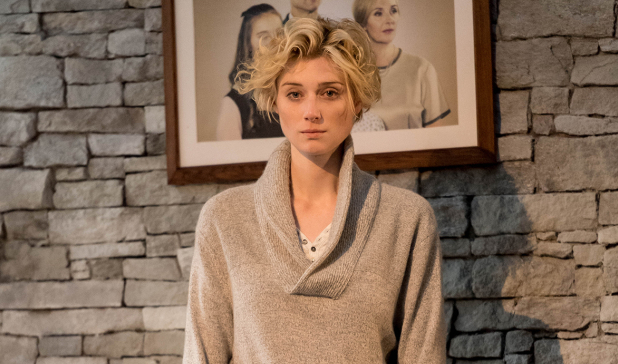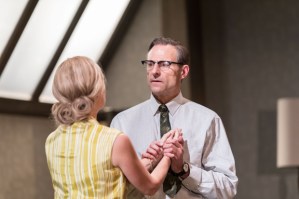Female nudity on stage has got to stop
After seeing several instances of female nudity on stage, Sarah Crompton asks whether it is ever really necessary

(© Manuel Harlan)
I have decided I have had enough. I keep seeing naked women on stage, and it’s got to stop.
It happened twice last week, in two plays that I much admired. In Robert Icke‘s production of David Hare‘s elegant psychological thriller The Red Barn, the wonderful Elizabeth Debicki strips off her top and walks into a bedroom, seducing Mark Strong in her wake. In the Belarus Free Theatre’s devastating study of schizophrenia Tomorrow I was Always a Lion, a woman strips naked and steps into a metal bath, where she beats her chest repeatedly throughout the following scene.
In both cases, there was, in my opinion, absolutely no need for the nudity. Both productions had conjured with effortless brilliance effects as various as a snowstorm and the fog of mental illness without for a second feeling they had to be depicted in an absolutely real manner. The evocation was enough.
I’m not being prudish about this. Or even – in a very British way – embarrassed. I have no problem with naked skin
In The Red Barn, the snowstorm was pretty convincing in Bunny Christie’s brilliant design; the fog of of illness was produced by cast members from the Belarus Free Theatre people smoking into the light of a phone. But neither was absolute reality. That’s what theatre does: it requires the willing suspension of disbelief. When Hedda Gabler shoots herself, the director can choose to show the blood or not. The important thing is that we have been so absorbed by her agonised state; we believe she might kill herself. And when the actress walks out to take her bow at the end of the evening, we are sophisticated enough to be simultaneously felled by the emotion we have just experienced and yet to recognise it was all make believe.
Yet somehow nudity, particularly female nudity, is different. I’m not being prudish about this. Or even – in a very British way – embarrassed. I have no problem with naked skin, which is a good thing since I seem to be seeing a lot of it. I sat through a production of The Lysistrata at Les Nuits des Fourvieres festival where everyone, male and female spent a long time with their clothes off.
I’d like every actor and director to think hard about whether female nudity is actually helping the scene or the story
My husband (Italian) has asked me to make it clear that having sat through a lot of this nakedness by my side, he finds the male nudity just as irritating and unnecessary as the female. But I have to admit that it is the women stripping off who worry me more, not least because there are more of them.
I’d like to argue that it is male directors who are quick to suggest a woman takes her clothes off for effect. But I know this is not always true. At the Edinburgh Festival, I went to see the feminist duo Rash Dash perform Two Man Show, a supposedly coruscating attack on patriarchy, while wearing next to nothing a lot of the time. I felt very cross, though they obviously didn’t.
At root, I worry that women feel that they have to be willing to take their clothes off as a visible symbol of their commitment. They want to show how seriously they regard their craft, so they are prepared to do anything to convince us that their involvement with the tale they are telling is real. Men who strip bare possibly feel this too. Yet they don’t seem to be asked to do so quite so often and this is because, culturally, naked men still cause more offence than nude or half-naked women.
I cannot think of many instances where nudity, per se, is absolutely required. Possibly in a depiction of torture, yet even there I am uneasy at the contrast between a naked shivering woman and a usually-clothed man. I find I become more concerned about the inequality of revelation required than the actual horror that I am meant to be thinking about.
So I’d just like to say I’d like every single actor, and every director to think incredibly hard about whether female nudity is actually helping the scene or the story. If it is, then OK. I’ll put up with it. But at the moment it just feels like an easy option of vulnerability, or availability. A failure, in fact, to use the imagination. Which is what I go to the theatre for.














